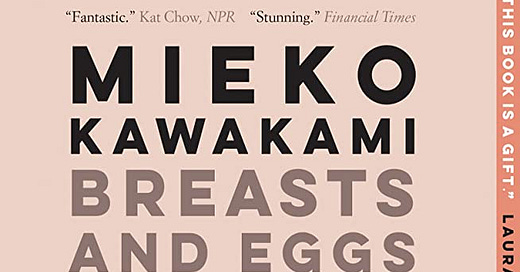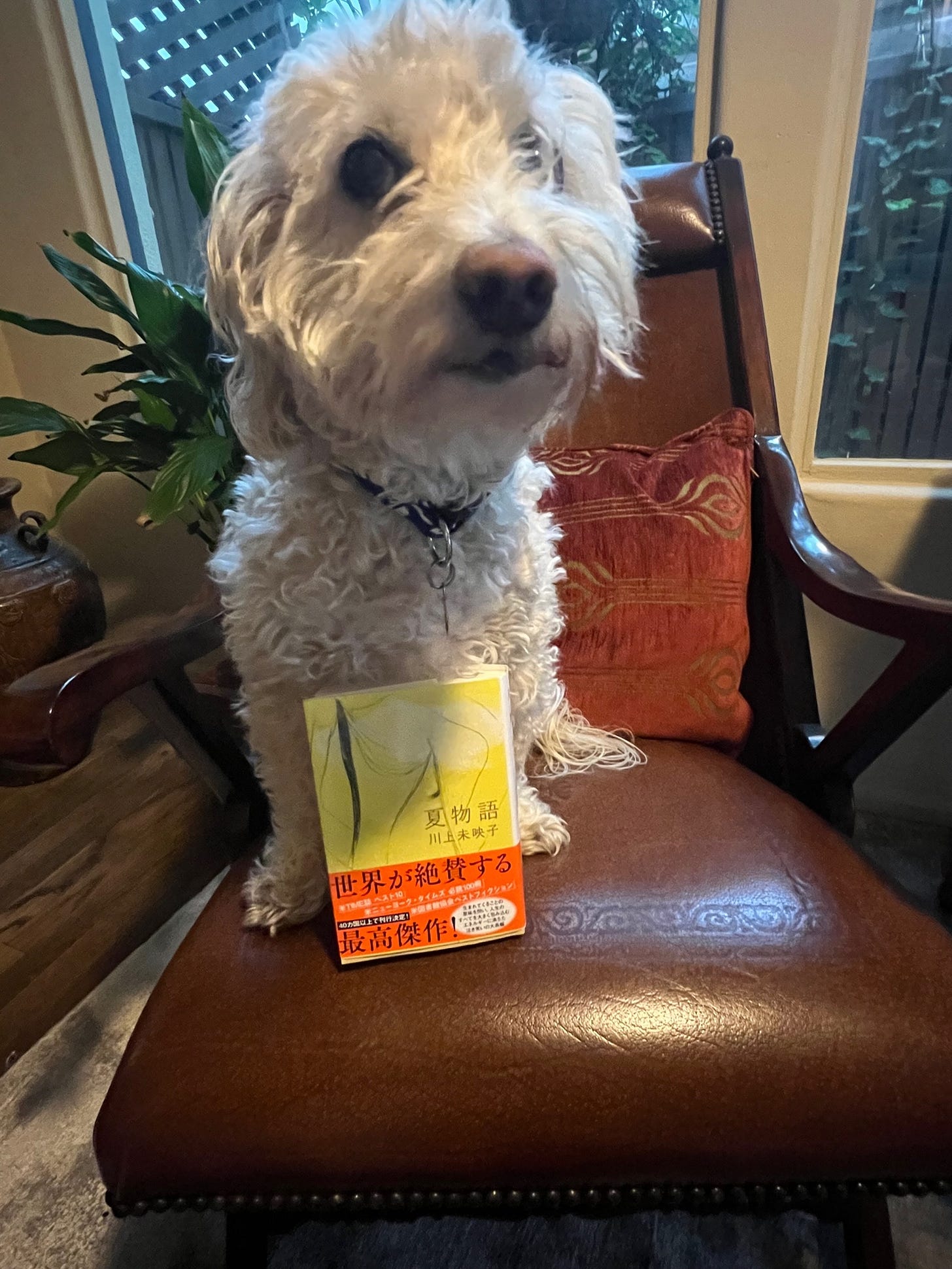1.
I am finally reading Mieko Kawakami’s novel Breasts and Eggs. For whatever reason, I didn’t think I’d be interested in this writer until I ran across a recent interview in the New York Times about her new book, Sisters in Yellow. In the interview, the author refers to this new novel as “My version of the Makioka Sisters.”
That caught my attention since Tanizaki’s Makioka Sisters is my favorite modern Japanese novel!
I immediately ordered the book from Kinokunya Online —and am still waiting for it to arrive. (The English version won’t be available until 2025). In the meantime, I picked up a copy of Breasts and Eggs, the novel that shot her to fame outside of Japan.
I can still remember the somewhat heated discussion about the translation of this novel, which also mirrors discussions I recall from grad about the English translation of the Makioka Sisters. Specifically about how to handle the copious use of Osaka dialect (Osaka-ben) in the novel.
Japanese is characterized as being a language with strong regional speech patterns. These accents and dialects in Japanese are much stronger than say a Texas drawl or a South Jersey twang sounds to someone in California. On Japanese TV, when there are people speaking in the dialects of the northern part of the country, you will often find subtitles because it almost impossible to understand what they are saying otherwise. Especially, for someone who learned Japanese in Tokyo where the standard Japanese (is spoken, it is tough to understand what people from Osaka are saying! According to Wikipedia, “Osaka-ben” is characterized by people in Tokyo as being more melodic and harsher.
It is the lovely melodic quality of Osaka-ben that is being lost in translations. But what can you do?
In fiction classes I’ve taken, we sometimes talk about characters who speak with accents or in “broken English.” Most teachers I’ve had have suggested avoiding this… or at least to remember that a “little goes a long way.” I am thinking of how much I dislike the way Pico Iyer puts so much broken English in the voice of his Japanese wife. It really grates. Some people might feel differently. But my teachers have pointed out that even in Huckleberry Finn, the dialect and speech patterns are used more at the beginning and that Mark Twain laid off after that to prevent readers from growing tired.
In the English translation of Breasts and Eggs, the translators Sam Bett and David Boyd do what Seidensticker did for the Makioka Sisters—translate into international English and then hope readers will understand that the characters are speaking in dialect by indirect references to conversations or interiority about what it is feels like speaking in Osaka-ben. The characters discuss what it feels like to speak in Osada-ben, thereby alerting English readers that something is going on.
This is definitely my preferred approach, though of course, something is lost. In the case of Breast and Eggs the melody is missing from the English translation completely.
Listening on Audible to the first part of the book 夏物語 in Japanese, it is not the dialect that is missing from the translation but the musicality of her sentences. The English is totally flat. Instead of the “harshness” or “melodiousness” of Osaka dialect, we have a polite and correct Japanese that renders the main character as an objective and calm observer or events—instead of the emotional and passionate person she appears in the Japanese version.
Im 2012 a different version of a translation was published in Words Without Borders by translator Louise Heal Kawai that reads in a very different way. I will leave it to you to decide which approach you prefer.
As she explained:
I’ve long been aware of the many parallels between Mieko Kawakami’s home city of Osaka, Japan, and my own hometown, Manchester in the UK. ... The inhabitants of both cities are said to be friendly, down-to-earth, and very outspoken, just as the characters in Breasts and Eggs. And most importantly, the dialect spoken in Osaka and Western Japan is markedly different from that of Tokyo and the East. Often frowned upon as sounding rather rough or unsophisticated, Mancunian (adjective meaning “of Manchester”) is to my ears a perfect rendering of Osaka dialect.
Here are two examples
Bett & Boyd:
I’ve been thinking about getting breast implants.” It had been three months since Makiko had called me up to make this declaration
Heal Kawai:
It was about a month ago Makiko phoned me to say she was coming. “Natsuko, I’m thinking of getting me boobs done.”
Bett & Boyd:
What’s wrong with her? What the hell is wrong with her? She’s being an idiot, the biggest idiot.
Heal Kawai:
She’s off her trolley, my Mum, daft, barmy, bonkers, thick as two short planks.
2.
The first part of Breast and Eggs was originally published as a novella, which was awarded the prestigious Akutagawa Prize. This was never translated into English as a stand-alone —but appears in its altered form in the English translation of Natsu monogatarai as part one.
夏物語 means Summer Tale (or Natsu’s story, as Natsu is the main character’s name) but the novella’s name Breasts and Eggs was retained for the English Translation—
Some reviewers commented that is the first part was about breasts then the second part is definitely about eggs. This second part, which is twice as long, takes place ten years later and is written in much lighter tone about the author’s path to becoming a writer—and perhaps a mother.
On the issue of becoming a published author, I think Japan is quite different from the US. First, historically, so many books have been published in serialized form. In newspapers or magazines. Kawakami’s real-life case mirrors that of her protagonist, starting off as a blogger. Her first novel is basically published online on her blog. Publishing in serialized form is quite a different kettle of fish since a writer doesn’t go back and rewrite after finishing the entire story. And each part must also be a stand-alone on some level. There must be something that each section ends with that keeps readers coming back.
I think publishing a novel on the Internet is exciting and I don’t know why it is not more popular in the English-speaking world. I can only think of the movie Julie and Julia that started off life as an online memoir. Kind of like Kawakami’s first novel, she put the book online slowly as she was writing it in real time and this was later picked up as the blog gained popularity.
(I had no idea that the author of the memoir Julie and Julia died during Covid of cardiac arrest. She was only 49).
Kawakami’s real break —and this is mirrored in the novel— came when a story she wrote won a prize in a writing contest. And that was that. In Japan, writers do not get MFAs. And there are no big conferences with agents presents where aspiring writers have to try to sell their work to an agent, who will then sell it to the publishers.
Up till now, I have only experienced one writers’ conference in my life and it was a terrible experience. I loved studying with the wonderful novelist Richard Russo in beautiful Kauai —and also was so happy to meet a writer friend at the conference —hoping she will be a lifetime friend. Those two alone were worth the enormous cost —and yet for me the conference was pretty disheartening.
That said, I am giving this one last try this summer —in June at Lighthouse, studying with my beloved novelist Katie Kitamura; then in July at Sewanee, hopefully studying with Kirstin Valdez Quade; and finally at Breadloaf (where I received a Contributors Award). I am hoping to study with Jesse Row there.
I am really nervous about another disturbing experience. If anything interesting happens I will write something here…. But as a start I want to take Mieko Kawakami’s words from Breasts and Eggs to heart and just focus on the writing—the sheer joy of fiction! And not get caught up in hoop jumping and “publishing.”
Writing makes me happy. But it goes beyond that. Writing is my life’s work. I am absolutely positive that this is what I’m here to do. Even if it turns out that I don’t have the ability, and no one out there wants to read a single word of it, there’s nothing I can do about this feeling. I can’t make it go away. I recognize that luck, effort, and ability are often indistinguishable. And I know that, in the end, I’m just another human being, who’s born only to die. I know that“in reality, it makes no difference whether I write novels, and it makes no difference if anyone cares. With all the countless books already out there, the world won’t notice if I fail to publish even one book with my name on it. That’s no tragedy. I know that. I get that.”
— Breasts and Eggs: A Novel by Mieko Kawakami






There’s so much here, what a great essay. I personally really dislike writer gatherings so I admire you for continuing to do the writer conferences. I’ve done a few and I’m done now. :) I get irritated with the various writing workshops and MFA-type courses. I think you wrote something awhile back about the American literary workshop creating a certain kind of sameness (I’m sure I imputed that from your essay, you probably didn’t say that exactly), how they are not very diverse, how they teach a certain kind of “voice,” etc. Your essay emboldened me, and now I think carefully about “audience” when I am writing and reading, and I’ve ditched the creative writing masters I was thinking of doing. I don’t want to write for the New Yorker, or the people who wish they wrote for the New Yorker. And I often dislike snobby literature, so that explains why I feel prickly about it, but I appreciated the sources you cited, because apparently I’m not the only one who dislikes the stranglehold of the MFA.
I didn’t care for Breasts and Eggs, and once again I think it was “audience.” I don’t think the author is talking to me. You raise a good question, which is that maybe part of my disconnect had to do with the translation. But I don’t know if it’s the Osaka-ben. Accents mean something quite different in the U.S. and Britain. They’re often related to social class, and it bothers me when they are used indiscriminately. I think I’d rather have the neutral Japanese with subtle comments to establish place. And again, it’s “audience.” Japanese people have a reaction to Osaka-ben that English-speakers would not.
Thanks again for this, lots of thoughts here!
I've read neither "The Makioka Sisters" nor "Sasame-yuki". But I decided many years ago that Seidensticker is a past master at translating any Japanese literary work into "Seidensticker-ese" -- a flat, monotonous, emotionless drone, drained of any energy or panache. Genji, Yuki-guni, you name it, it all reads the same: quietly spoken, disconnected sentences. I once did a quick comparison of a Seidensticker translation of a short story with the original Japanese. The mechanics of the translation were immediately obvious. Any slightly complex sentences were reduced to the same formulaic style of simple sentences without too much attempt at linking or "nesting" (grammatical complexity). I don't know why Seidensticker has the reputation he does. He is quite literally the enemy of good translation.